Legal Analysis: Privacy Infringement in Equity and Trust Law
VerifiedAdded on 2021/01/01
|13
|4620
|343
Case Study
AI Summary
This case study analyzes a scenario involving privacy infringement, specifically focusing on a celebrity couple's wedding and the unauthorized publication of photographs by a magazine. The case explores the infringement of the right to privacy under UK law, referencing the Human Rights Act 1998 and the European Convention on Human Rights. It examines the concept of an injunction as a legal remedy, referencing the Senior Courts Act 1981 and the case of American Cyanamid v Ethicon, as well as the case of Douglas v Hello! Ltd. The analysis applies these legal principles to determine whether the celebrity couple has grounds for an interim injunction to prevent further publication of the photographs. The study concludes that an interim injunction is a viable remedy to stop the magazine from publishing the photographs, emphasizing the importance of protecting the couple's privacy rights.

Equity and Trust
Paraphrase This Document
Need a fresh take? Get an instant paraphrase of this document with our AI Paraphraser

TABLE OF CONTENTS
MAIN BODY...................................................................................................................................1
SCENARIO 1...................................................................................................................................1
SCENARIO 2...................................................................................................................................4
REFERENCES................................................................................................................................8
MAIN BODY...................................................................................................................................1
SCENARIO 1...................................................................................................................................1
SCENARIO 2...................................................................................................................................4
REFERENCES................................................................................................................................8
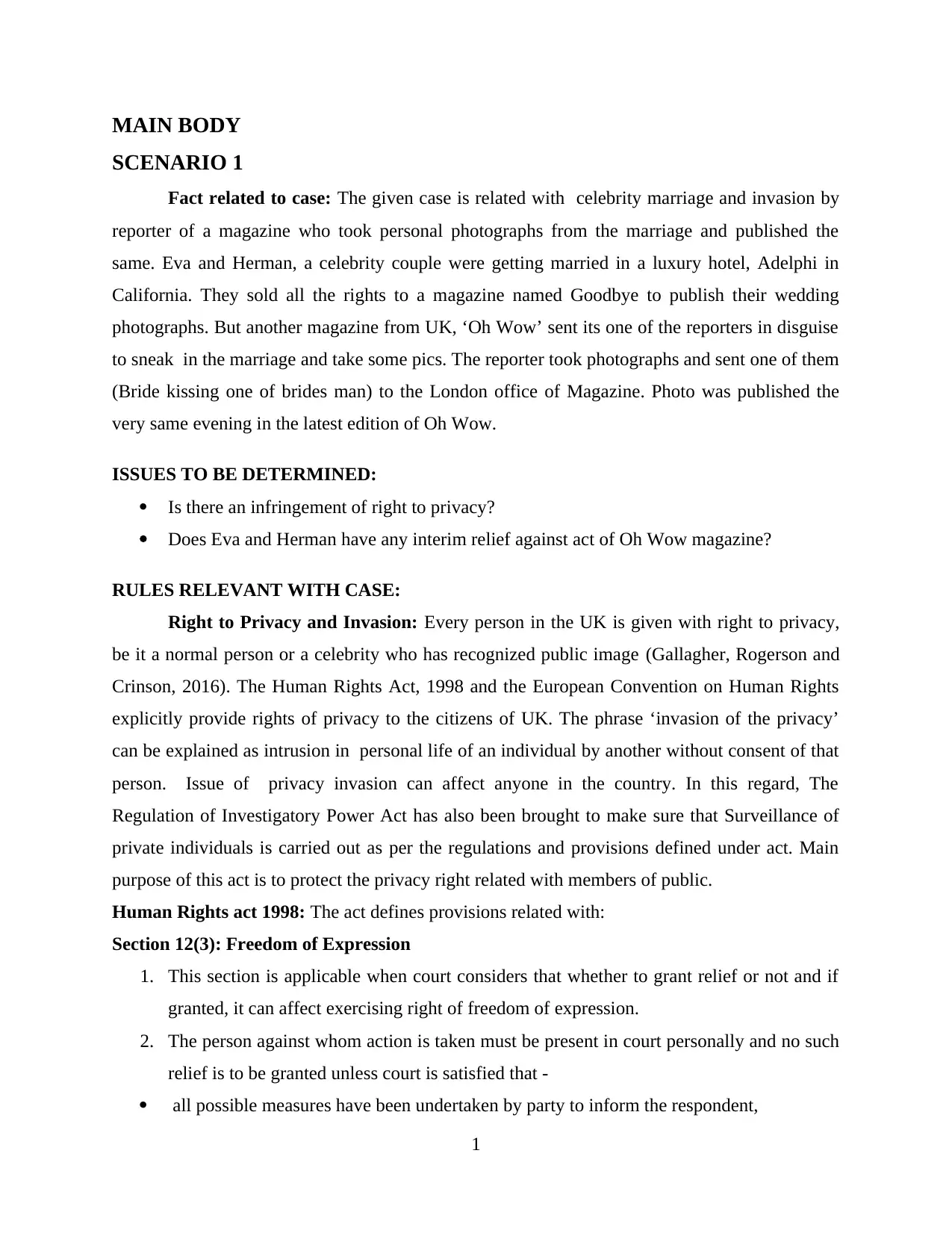
MAIN BODY
SCENARIO 1
Fact related to case: The given case is related with celebrity marriage and invasion by
reporter of a magazine who took personal photographs from the marriage and published the
same. Eva and Herman, a celebrity couple were getting married in a luxury hotel, Adelphi in
California. They sold all the rights to a magazine named Goodbye to publish their wedding
photographs. But another magazine from UK, ‘Oh Wow’ sent its one of the reporters in disguise
to sneak in the marriage and take some pics. The reporter took photographs and sent one of them
(Bride kissing one of brides man) to the London office of Magazine. Photo was published the
very same evening in the latest edition of Oh Wow.
ISSUES TO BE DETERMINED:
Is there an infringement of right to privacy?
Does Eva and Herman have any interim relief against act of Oh Wow magazine?
RULES RELEVANT WITH CASE:
Right to Privacy and Invasion: Every person in the UK is given with right to privacy,
be it a normal person or a celebrity who has recognized public image (Gallagher, Rogerson and
Crinson, 2016). The Human Rights Act, 1998 and the European Convention on Human Rights
explicitly provide rights of privacy to the citizens of UK. The phrase ‘invasion of the privacy’
can be explained as intrusion in personal life of an individual by another without consent of that
person. Issue of privacy invasion can affect anyone in the country. In this regard, The
Regulation of Investigatory Power Act has also been brought to make sure that Surveillance of
private individuals is carried out as per the regulations and provisions defined under act. Main
purpose of this act is to protect the privacy right related with members of public.
Human Rights act 1998: The act defines provisions related with:
Section 12(3): Freedom of Expression
1. This section is applicable when court considers that whether to grant relief or not and if
granted, it can affect exercising right of freedom of expression.
2. The person against whom action is taken must be present in court personally and no such
relief is to be granted unless court is satisfied that -
all possible measures have been undertaken by party to inform the respondent,
1
SCENARIO 1
Fact related to case: The given case is related with celebrity marriage and invasion by
reporter of a magazine who took personal photographs from the marriage and published the
same. Eva and Herman, a celebrity couple were getting married in a luxury hotel, Adelphi in
California. They sold all the rights to a magazine named Goodbye to publish their wedding
photographs. But another magazine from UK, ‘Oh Wow’ sent its one of the reporters in disguise
to sneak in the marriage and take some pics. The reporter took photographs and sent one of them
(Bride kissing one of brides man) to the London office of Magazine. Photo was published the
very same evening in the latest edition of Oh Wow.
ISSUES TO BE DETERMINED:
Is there an infringement of right to privacy?
Does Eva and Herman have any interim relief against act of Oh Wow magazine?
RULES RELEVANT WITH CASE:
Right to Privacy and Invasion: Every person in the UK is given with right to privacy,
be it a normal person or a celebrity who has recognized public image (Gallagher, Rogerson and
Crinson, 2016). The Human Rights Act, 1998 and the European Convention on Human Rights
explicitly provide rights of privacy to the citizens of UK. The phrase ‘invasion of the privacy’
can be explained as intrusion in personal life of an individual by another without consent of that
person. Issue of privacy invasion can affect anyone in the country. In this regard, The
Regulation of Investigatory Power Act has also been brought to make sure that Surveillance of
private individuals is carried out as per the regulations and provisions defined under act. Main
purpose of this act is to protect the privacy right related with members of public.
Human Rights act 1998: The act defines provisions related with:
Section 12(3): Freedom of Expression
1. This section is applicable when court considers that whether to grant relief or not and if
granted, it can affect exercising right of freedom of expression.
2. The person against whom action is taken must be present in court personally and no such
relief is to be granted unless court is satisfied that -
all possible measures have been undertaken by party to inform the respondent,
1
⊘ This is a preview!⊘
Do you want full access?
Subscribe today to unlock all pages.

Trusted by 1+ million students worldwide
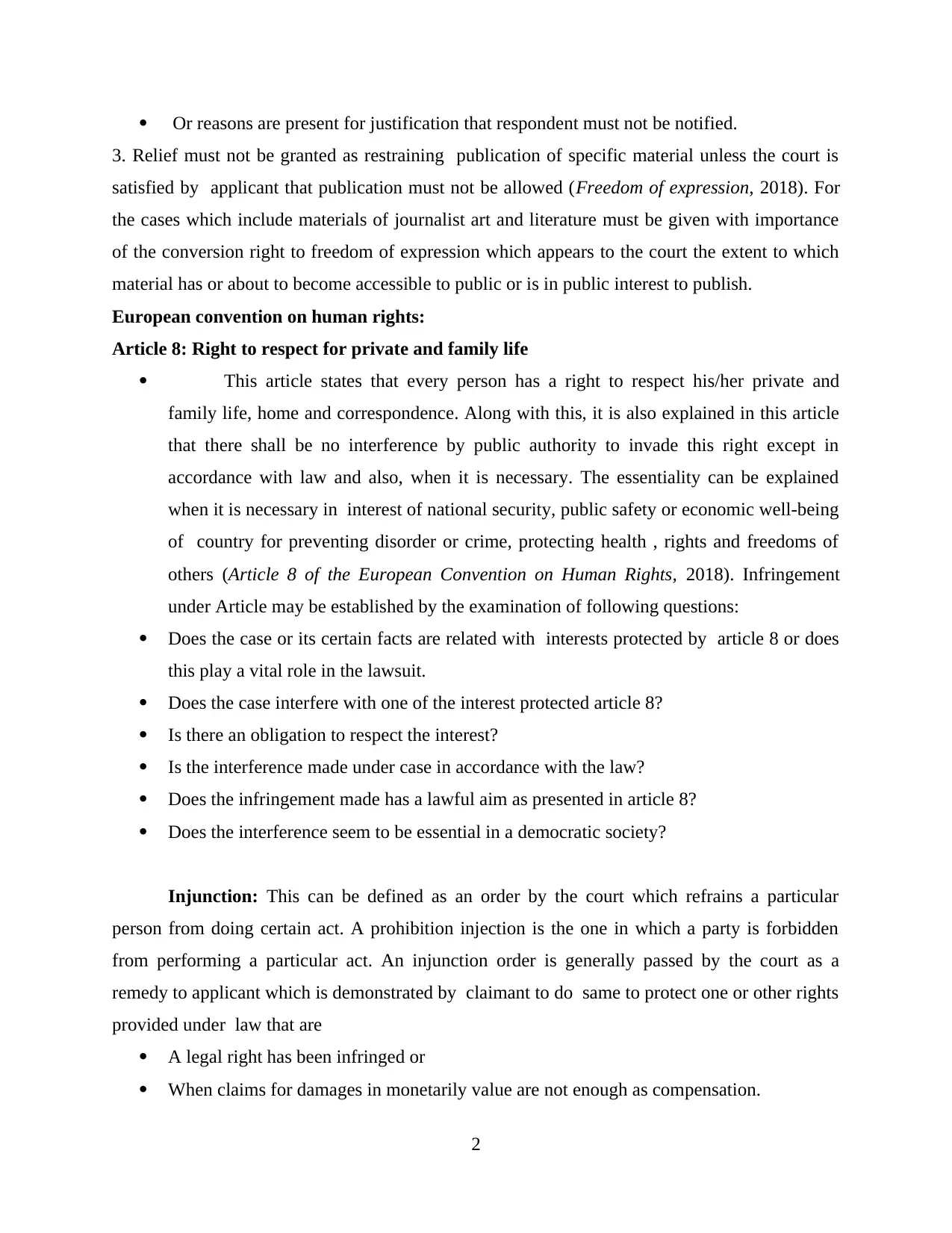
Or reasons are present for justification that respondent must not be notified.
3. Relief must not be granted as restraining publication of specific material unless the court is
satisfied by applicant that publication must not be allowed (Freedom of expression, 2018). For
the cases which include materials of journalist art and literature must be given with importance
of the conversion right to freedom of expression which appears to the court the extent to which
material has or about to become accessible to public or is in public interest to publish.
European convention on human rights:
Article 8: Right to respect for private and family life
This article states that every person has a right to respect his/her private and
family life, home and correspondence. Along with this, it is also explained in this article
that there shall be no interference by public authority to invade this right except in
accordance with law and also, when it is necessary. The essentiality can be explained
when it is necessary in interest of national security, public safety or economic well-being
of country for preventing disorder or crime, protecting health , rights and freedoms of
others (Article 8 of the European Convention on Human Rights, 2018). Infringement
under Article may be established by the examination of following questions:
Does the case or its certain facts are related with interests protected by article 8 or does
this play a vital role in the lawsuit.
Does the case interfere with one of the interest protected article 8?
Is there an obligation to respect the interest?
Is the interference made under case in accordance with the law?
Does the infringement made has a lawful aim as presented in article 8?
Does the interference seem to be essential in a democratic society?
Injunction: This can be defined as an order by the court which refrains a particular
person from doing certain act. A prohibition injection is the one in which a party is forbidden
from performing a particular act. An injunction order is generally passed by the court as a
remedy to applicant which is demonstrated by claimant to do same to protect one or other rights
provided under law that are
A legal right has been infringed or
When claims for damages in monetarily value are not enough as compensation.
2
3. Relief must not be granted as restraining publication of specific material unless the court is
satisfied by applicant that publication must not be allowed (Freedom of expression, 2018). For
the cases which include materials of journalist art and literature must be given with importance
of the conversion right to freedom of expression which appears to the court the extent to which
material has or about to become accessible to public or is in public interest to publish.
European convention on human rights:
Article 8: Right to respect for private and family life
This article states that every person has a right to respect his/her private and
family life, home and correspondence. Along with this, it is also explained in this article
that there shall be no interference by public authority to invade this right except in
accordance with law and also, when it is necessary. The essentiality can be explained
when it is necessary in interest of national security, public safety or economic well-being
of country for preventing disorder or crime, protecting health , rights and freedoms of
others (Article 8 of the European Convention on Human Rights, 2018). Infringement
under Article may be established by the examination of following questions:
Does the case or its certain facts are related with interests protected by article 8 or does
this play a vital role in the lawsuit.
Does the case interfere with one of the interest protected article 8?
Is there an obligation to respect the interest?
Is the interference made under case in accordance with the law?
Does the infringement made has a lawful aim as presented in article 8?
Does the interference seem to be essential in a democratic society?
Injunction: This can be defined as an order by the court which refrains a particular
person from doing certain act. A prohibition injection is the one in which a party is forbidden
from performing a particular act. An injunction order is generally passed by the court as a
remedy to applicant which is demonstrated by claimant to do same to protect one or other rights
provided under law that are
A legal right has been infringed or
When claims for damages in monetarily value are not enough as compensation.
2
Paraphrase This Document
Need a fresh take? Get an instant paraphrase of this document with our AI Paraphraser
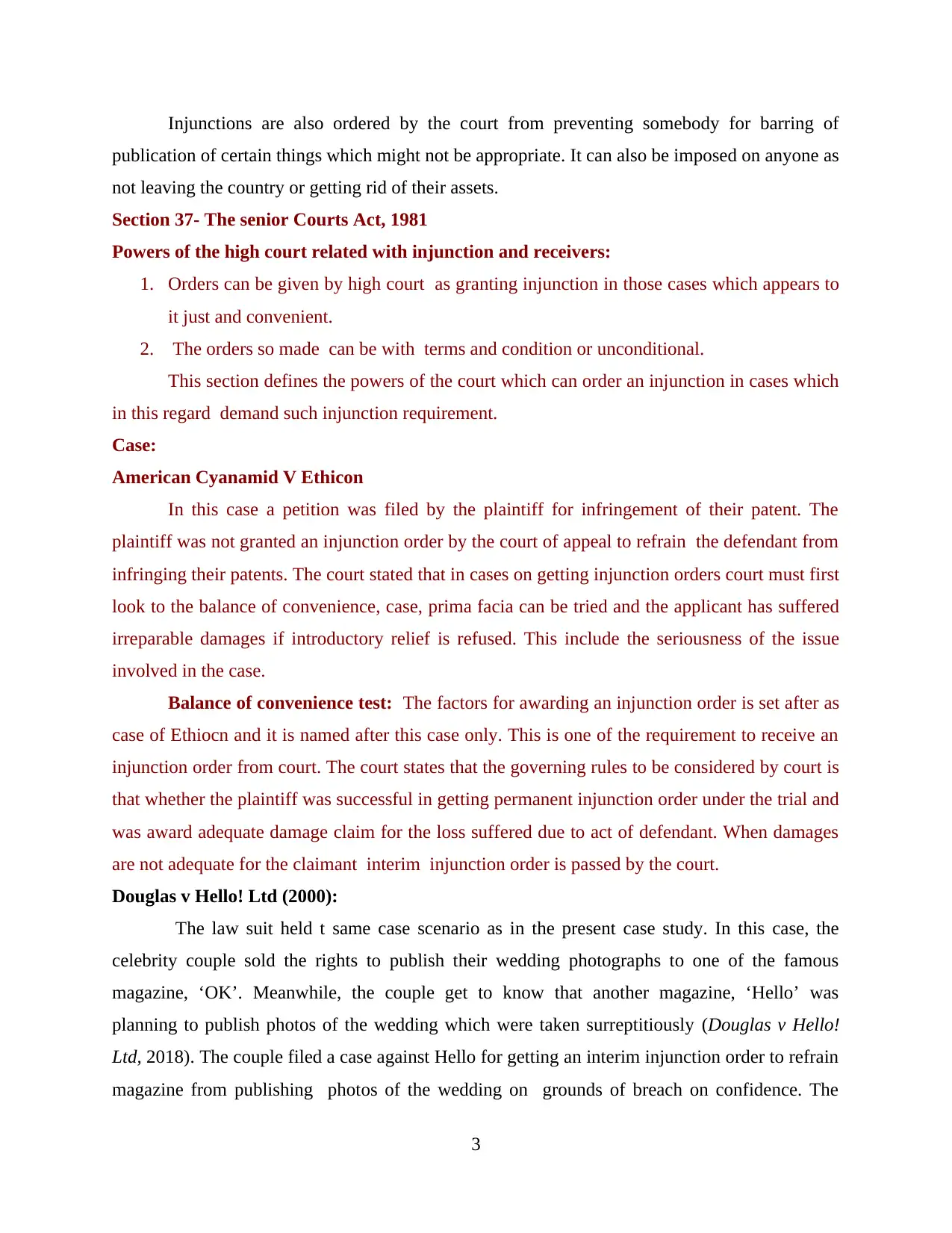
Injunctions are also ordered by the court from preventing somebody for barring of
publication of certain things which might not be appropriate. It can also be imposed on anyone as
not leaving the country or getting rid of their assets.
Section 37- The senior Courts Act, 1981
Powers of the high court related with injunction and receivers:
1. Orders can be given by high court as granting injunction in those cases which appears to
it just and convenient.
2. The orders so made can be with terms and condition or unconditional.
This section defines the powers of the court which can order an injunction in cases which
in this regard demand such injunction requirement.
Case:
American Cyanamid V Ethicon
In this case a petition was filed by the plaintiff for infringement of their patent. The
plaintiff was not granted an injunction order by the court of appeal to refrain the defendant from
infringing their patents. The court stated that in cases on getting injunction orders court must first
look to the balance of convenience, case, prima facia can be tried and the applicant has suffered
irreparable damages if introductory relief is refused. This include the seriousness of the issue
involved in the case.
Balance of convenience test: The factors for awarding an injunction order is set after as
case of Ethiocn and it is named after this case only. This is one of the requirement to receive an
injunction order from court. The court states that the governing rules to be considered by court is
that whether the plaintiff was successful in getting permanent injunction order under the trial and
was award adequate damage claim for the loss suffered due to act of defendant. When damages
are not adequate for the claimant interim injunction order is passed by the court.
Douglas v Hello! Ltd (2000):
The law suit held t same case scenario as in the present case study. In this case, the
celebrity couple sold the rights to publish their wedding photographs to one of the famous
magazine, ‘OK’. Meanwhile, the couple get to know that another magazine, ‘Hello’ was
planning to publish photos of the wedding which were taken surreptitiously (Douglas v Hello!
Ltd, 2018). The couple filed a case against Hello for getting an interim injunction order to refrain
magazine from publishing photos of the wedding on grounds of breach on confidence. The
3
publication of certain things which might not be appropriate. It can also be imposed on anyone as
not leaving the country or getting rid of their assets.
Section 37- The senior Courts Act, 1981
Powers of the high court related with injunction and receivers:
1. Orders can be given by high court as granting injunction in those cases which appears to
it just and convenient.
2. The orders so made can be with terms and condition or unconditional.
This section defines the powers of the court which can order an injunction in cases which
in this regard demand such injunction requirement.
Case:
American Cyanamid V Ethicon
In this case a petition was filed by the plaintiff for infringement of their patent. The
plaintiff was not granted an injunction order by the court of appeal to refrain the defendant from
infringing their patents. The court stated that in cases on getting injunction orders court must first
look to the balance of convenience, case, prima facia can be tried and the applicant has suffered
irreparable damages if introductory relief is refused. This include the seriousness of the issue
involved in the case.
Balance of convenience test: The factors for awarding an injunction order is set after as
case of Ethiocn and it is named after this case only. This is one of the requirement to receive an
injunction order from court. The court states that the governing rules to be considered by court is
that whether the plaintiff was successful in getting permanent injunction order under the trial and
was award adequate damage claim for the loss suffered due to act of defendant. When damages
are not adequate for the claimant interim injunction order is passed by the court.
Douglas v Hello! Ltd (2000):
The law suit held t same case scenario as in the present case study. In this case, the
celebrity couple sold the rights to publish their wedding photographs to one of the famous
magazine, ‘OK’. Meanwhile, the couple get to know that another magazine, ‘Hello’ was
planning to publish photos of the wedding which were taken surreptitiously (Douglas v Hello!
Ltd, 2018). The couple filed a case against Hello for getting an interim injunction order to refrain
magazine from publishing photos of the wedding on grounds of breach on confidence. The
3
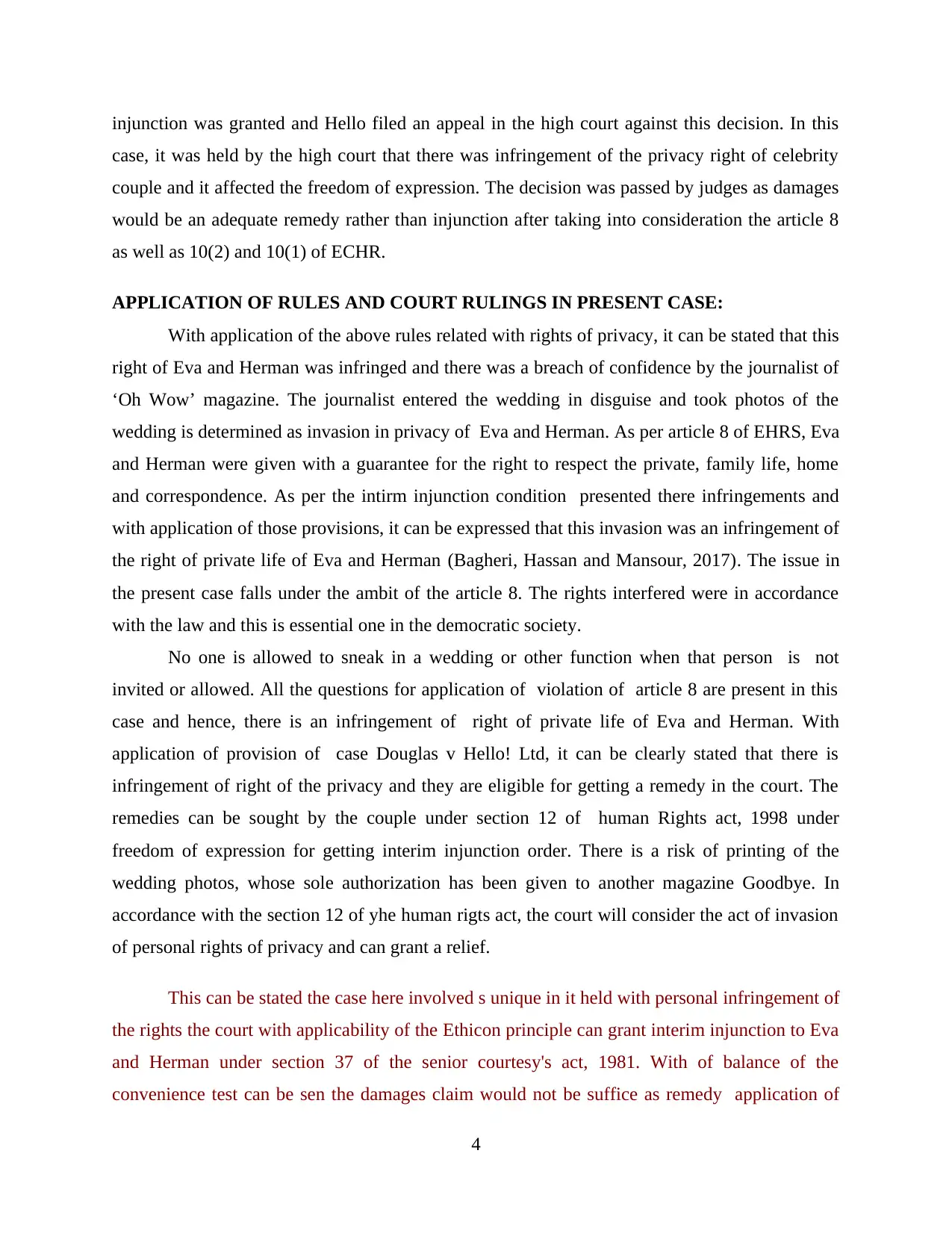
injunction was granted and Hello filed an appeal in the high court against this decision. In this
case, it was held by the high court that there was infringement of the privacy right of celebrity
couple and it affected the freedom of expression. The decision was passed by judges as damages
would be an adequate remedy rather than injunction after taking into consideration the article 8
as well as 10(2) and 10(1) of ECHR.
APPLICATION OF RULES AND COURT RULINGS IN PRESENT CASE:
With application of the above rules related with rights of privacy, it can be stated that this
right of Eva and Herman was infringed and there was a breach of confidence by the journalist of
‘Oh Wow’ magazine. The journalist entered the wedding in disguise and took photos of the
wedding is determined as invasion in privacy of Eva and Herman. As per article 8 of EHRS, Eva
and Herman were given with a guarantee for the right to respect the private, family life, home
and correspondence. As per the intirm injunction condition presented there infringements and
with application of those provisions, it can be expressed that this invasion was an infringement of
the right of private life of Eva and Herman (Bagheri, Hassan and Mansour, 2017). The issue in
the present case falls under the ambit of the article 8. The rights interfered were in accordance
with the law and this is essential one in the democratic society.
No one is allowed to sneak in a wedding or other function when that person is not
invited or allowed. All the questions for application of violation of article 8 are present in this
case and hence, there is an infringement of right of private life of Eva and Herman. With
application of provision of case Douglas v Hello! Ltd, it can be clearly stated that there is
infringement of right of the privacy and they are eligible for getting a remedy in the court. The
remedies can be sought by the couple under section 12 of human Rights act, 1998 under
freedom of expression for getting interim injunction order. There is a risk of printing of the
wedding photos, whose sole authorization has been given to another magazine Goodbye. In
accordance with the section 12 of yhe human rigts act, the court will consider the act of invasion
of personal rights of privacy and can grant a relief.
This can be stated the case here involved s unique in it held with personal infringement of
the rights the court with applicability of the Ethicon principle can grant interim injunction to Eva
and Herman under section 37 of the senior courtesy's act, 1981. With of balance of the
convenience test can be sen the damages claim would not be suffice as remedy application of
4
case, it was held by the high court that there was infringement of the privacy right of celebrity
couple and it affected the freedom of expression. The decision was passed by judges as damages
would be an adequate remedy rather than injunction after taking into consideration the article 8
as well as 10(2) and 10(1) of ECHR.
APPLICATION OF RULES AND COURT RULINGS IN PRESENT CASE:
With application of the above rules related with rights of privacy, it can be stated that this
right of Eva and Herman was infringed and there was a breach of confidence by the journalist of
‘Oh Wow’ magazine. The journalist entered the wedding in disguise and took photos of the
wedding is determined as invasion in privacy of Eva and Herman. As per article 8 of EHRS, Eva
and Herman were given with a guarantee for the right to respect the private, family life, home
and correspondence. As per the intirm injunction condition presented there infringements and
with application of those provisions, it can be expressed that this invasion was an infringement of
the right of private life of Eva and Herman (Bagheri, Hassan and Mansour, 2017). The issue in
the present case falls under the ambit of the article 8. The rights interfered were in accordance
with the law and this is essential one in the democratic society.
No one is allowed to sneak in a wedding or other function when that person is not
invited or allowed. All the questions for application of violation of article 8 are present in this
case and hence, there is an infringement of right of private life of Eva and Herman. With
application of provision of case Douglas v Hello! Ltd, it can be clearly stated that there is
infringement of right of the privacy and they are eligible for getting a remedy in the court. The
remedies can be sought by the couple under section 12 of human Rights act, 1998 under
freedom of expression for getting interim injunction order. There is a risk of printing of the
wedding photos, whose sole authorization has been given to another magazine Goodbye. In
accordance with the section 12 of yhe human rigts act, the court will consider the act of invasion
of personal rights of privacy and can grant a relief.
This can be stated the case here involved s unique in it held with personal infringement of
the rights the court with applicability of the Ethicon principle can grant interim injunction to Eva
and Herman under section 37 of the senior courtesy's act, 1981. With of balance of the
convenience test can be sen the damages claim would not be suffice as remedy application of
4
⊘ This is a preview!⊘
Do you want full access?
Subscribe today to unlock all pages.

Trusted by 1+ million students worldwide
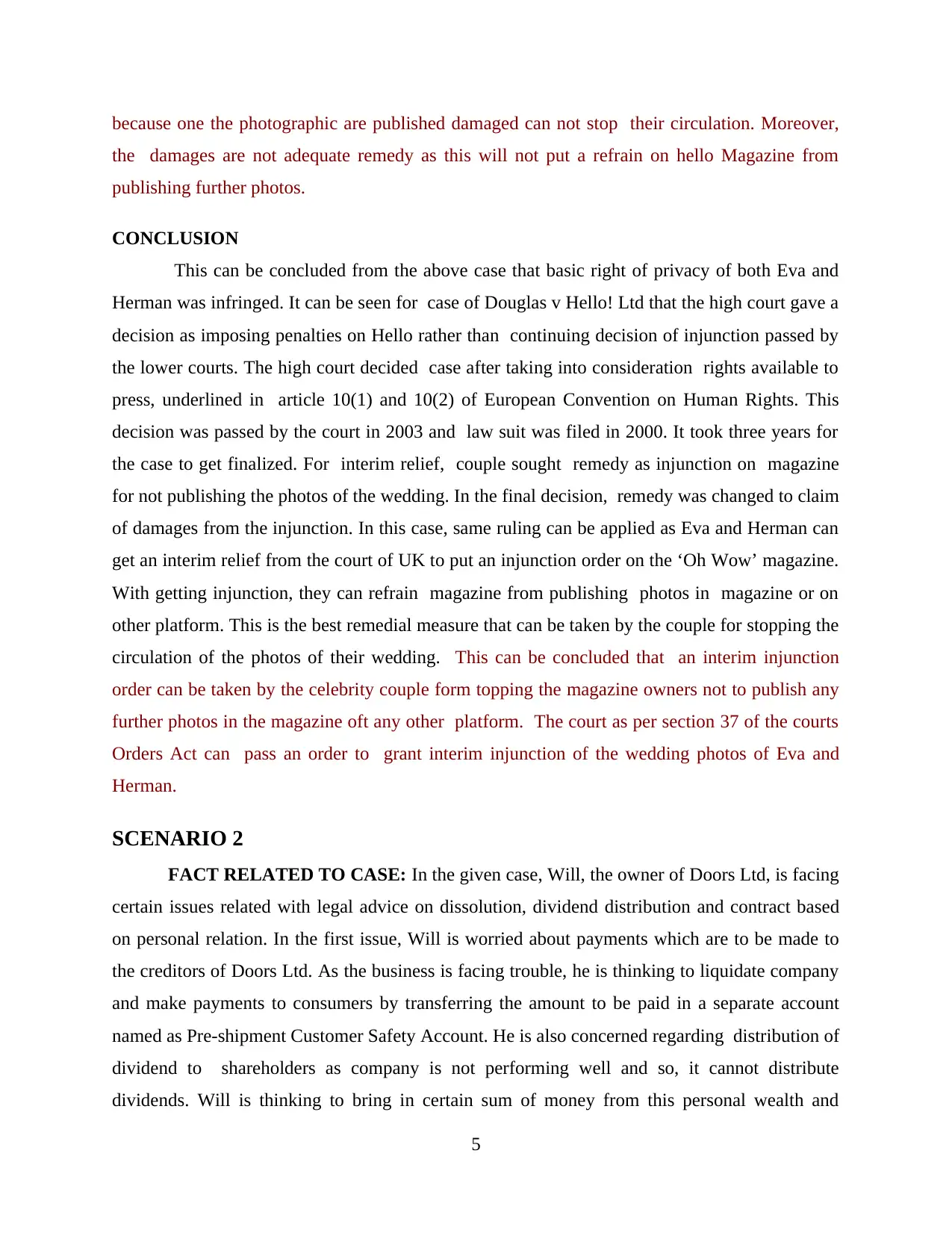
because one the photographic are published damaged can not stop their circulation. Moreover,
the damages are not adequate remedy as this will not put a refrain on hello Magazine from
publishing further photos.
CONCLUSION
This can be concluded from the above case that basic right of privacy of both Eva and
Herman was infringed. It can be seen for case of Douglas v Hello! Ltd that the high court gave a
decision as imposing penalties on Hello rather than continuing decision of injunction passed by
the lower courts. The high court decided case after taking into consideration rights available to
press, underlined in article 10(1) and 10(2) of European Convention on Human Rights. This
decision was passed by the court in 2003 and law suit was filed in 2000. It took three years for
the case to get finalized. For interim relief, couple sought remedy as injunction on magazine
for not publishing the photos of the wedding. In the final decision, remedy was changed to claim
of damages from the injunction. In this case, same ruling can be applied as Eva and Herman can
get an interim relief from the court of UK to put an injunction order on the ‘Oh Wow’ magazine.
With getting injunction, they can refrain magazine from publishing photos in magazine or on
other platform. This is the best remedial measure that can be taken by the couple for stopping the
circulation of the photos of their wedding. This can be concluded that an interim injunction
order can be taken by the celebrity couple form topping the magazine owners not to publish any
further photos in the magazine oft any other platform. The court as per section 37 of the courts
Orders Act can pass an order to grant interim injunction of the wedding photos of Eva and
Herman.
SCENARIO 2
FACT RELATED TO CASE: In the given case, Will, the owner of Doors Ltd, is facing
certain issues related with legal advice on dissolution, dividend distribution and contract based
on personal relation. In the first issue, Will is worried about payments which are to be made to
the creditors of Doors Ltd. As the business is facing trouble, he is thinking to liquidate company
and make payments to consumers by transferring the amount to be paid in a separate account
named as Pre-shipment Customer Safety Account. He is also concerned regarding distribution of
dividend to shareholders as company is not performing well and so, it cannot distribute
dividends. Will is thinking to bring in certain sum of money from this personal wealth and
5
the damages are not adequate remedy as this will not put a refrain on hello Magazine from
publishing further photos.
CONCLUSION
This can be concluded from the above case that basic right of privacy of both Eva and
Herman was infringed. It can be seen for case of Douglas v Hello! Ltd that the high court gave a
decision as imposing penalties on Hello rather than continuing decision of injunction passed by
the lower courts. The high court decided case after taking into consideration rights available to
press, underlined in article 10(1) and 10(2) of European Convention on Human Rights. This
decision was passed by the court in 2003 and law suit was filed in 2000. It took three years for
the case to get finalized. For interim relief, couple sought remedy as injunction on magazine
for not publishing the photos of the wedding. In the final decision, remedy was changed to claim
of damages from the injunction. In this case, same ruling can be applied as Eva and Herman can
get an interim relief from the court of UK to put an injunction order on the ‘Oh Wow’ magazine.
With getting injunction, they can refrain magazine from publishing photos in magazine or on
other platform. This is the best remedial measure that can be taken by the couple for stopping the
circulation of the photos of their wedding. This can be concluded that an interim injunction
order can be taken by the celebrity couple form topping the magazine owners not to publish any
further photos in the magazine oft any other platform. The court as per section 37 of the courts
Orders Act can pass an order to grant interim injunction of the wedding photos of Eva and
Herman.
SCENARIO 2
FACT RELATED TO CASE: In the given case, Will, the owner of Doors Ltd, is facing
certain issues related with legal advice on dissolution, dividend distribution and contract based
on personal relation. In the first issue, Will is worried about payments which are to be made to
the creditors of Doors Ltd. As the business is facing trouble, he is thinking to liquidate company
and make payments to consumers by transferring the amount to be paid in a separate account
named as Pre-shipment Customer Safety Account. He is also concerned regarding distribution of
dividend to shareholders as company is not performing well and so, it cannot distribute
dividends. Will is thinking to bring in certain sum of money from this personal wealth and
5
Paraphrase This Document
Need a fresh take? Get an instant paraphrase of this document with our AI Paraphraser
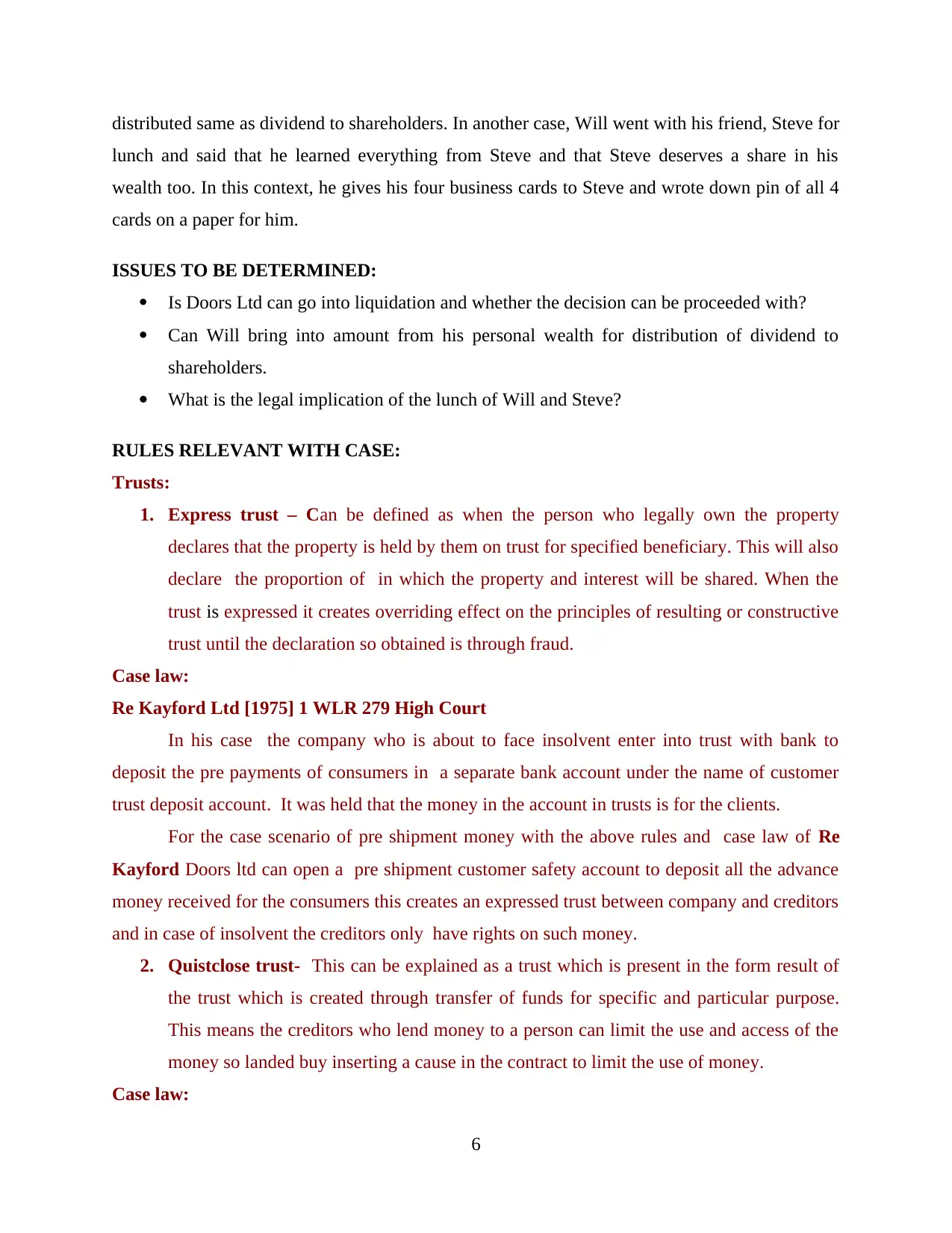
distributed same as dividend to shareholders. In another case, Will went with his friend, Steve for
lunch and said that he learned everything from Steve and that Steve deserves a share in his
wealth too. In this context, he gives his four business cards to Steve and wrote down pin of all 4
cards on a paper for him.
ISSUES TO BE DETERMINED:
Is Doors Ltd can go into liquidation and whether the decision can be proceeded with?
Can Will bring into amount from his personal wealth for distribution of dividend to
shareholders.
What is the legal implication of the lunch of Will and Steve?
RULES RELEVANT WITH CASE:
Trusts:
1. Express trust – Can be defined as when the person who legally own the property
declares that the property is held by them on trust for specified beneficiary. This will also
declare the proportion of in which the property and interest will be shared. When the
trust is expressed it creates overriding effect on the principles of resulting or constructive
trust until the declaration so obtained is through fraud.
Case law:
Re Kayford Ltd [1975] 1 WLR 279 High Court
In his case the company who is about to face insolvent enter into trust with bank to
deposit the pre payments of consumers in a separate bank account under the name of customer
trust deposit account. It was held that the money in the account in trusts is for the clients.
For the case scenario of pre shipment money with the above rules and case law of Re
Kayford Doors ltd can open a pre shipment customer safety account to deposit all the advance
money received for the consumers this creates an expressed trust between company and creditors
and in case of insolvent the creditors only have rights on such money.
2. Quistclose trust- This can be explained as a trust which is present in the form result of
the trust which is created through transfer of funds for specific and particular purpose.
This means the creditors who lend money to a person can limit the use and access of the
money so landed buy inserting a cause in the contract to limit the use of money.
Case law:
6
lunch and said that he learned everything from Steve and that Steve deserves a share in his
wealth too. In this context, he gives his four business cards to Steve and wrote down pin of all 4
cards on a paper for him.
ISSUES TO BE DETERMINED:
Is Doors Ltd can go into liquidation and whether the decision can be proceeded with?
Can Will bring into amount from his personal wealth for distribution of dividend to
shareholders.
What is the legal implication of the lunch of Will and Steve?
RULES RELEVANT WITH CASE:
Trusts:
1. Express trust – Can be defined as when the person who legally own the property
declares that the property is held by them on trust for specified beneficiary. This will also
declare the proportion of in which the property and interest will be shared. When the
trust is expressed it creates overriding effect on the principles of resulting or constructive
trust until the declaration so obtained is through fraud.
Case law:
Re Kayford Ltd [1975] 1 WLR 279 High Court
In his case the company who is about to face insolvent enter into trust with bank to
deposit the pre payments of consumers in a separate bank account under the name of customer
trust deposit account. It was held that the money in the account in trusts is for the clients.
For the case scenario of pre shipment money with the above rules and case law of Re
Kayford Doors ltd can open a pre shipment customer safety account to deposit all the advance
money received for the consumers this creates an expressed trust between company and creditors
and in case of insolvent the creditors only have rights on such money.
2. Quistclose trust- This can be explained as a trust which is present in the form result of
the trust which is created through transfer of funds for specific and particular purpose.
This means the creditors who lend money to a person can limit the use and access of the
money so landed buy inserting a cause in the contract to limit the use of money.
Case law:
6
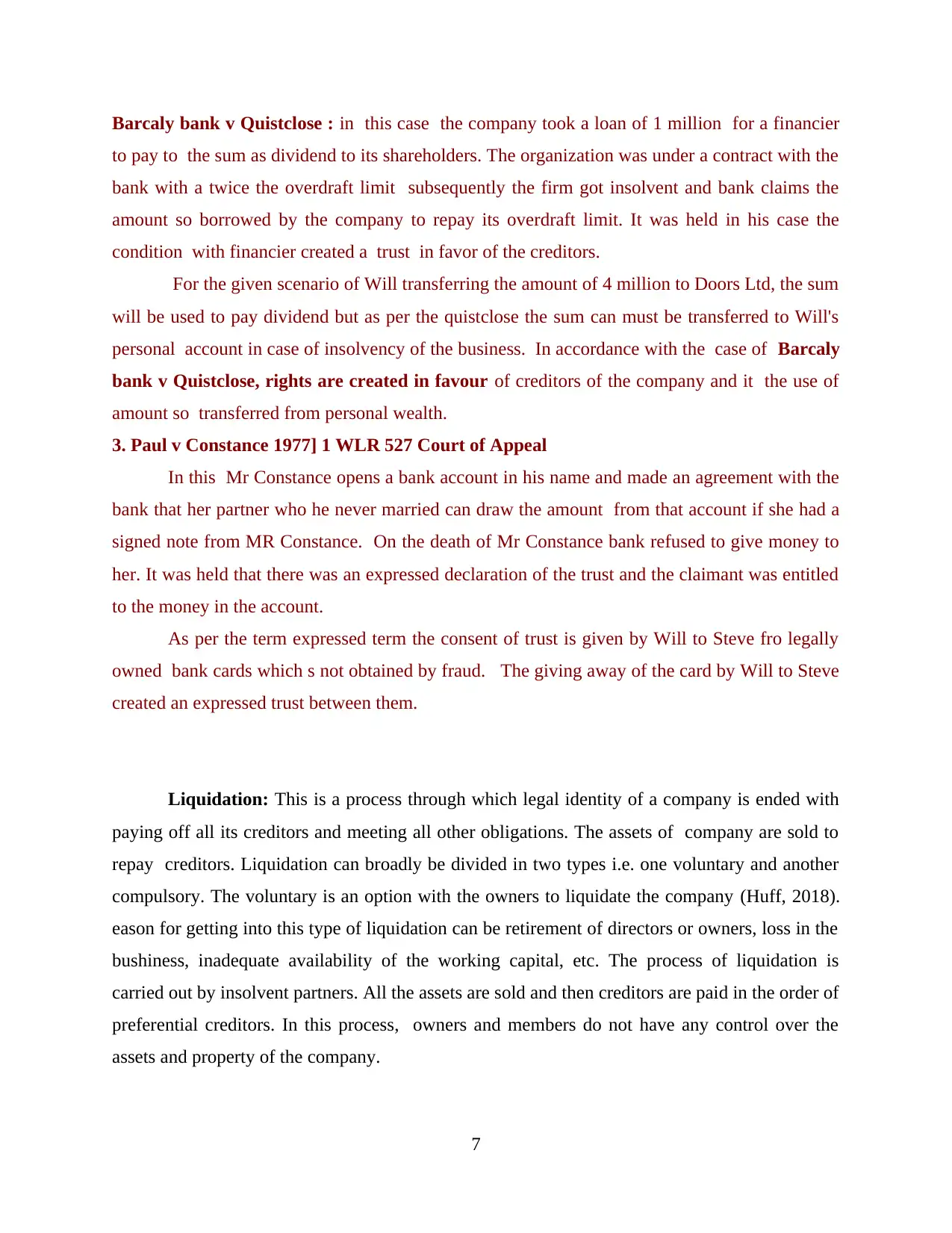
Barcaly bank v Quistclose : in this case the company took a loan of 1 million for a financier
to pay to the sum as dividend to its shareholders. The organization was under a contract with the
bank with a twice the overdraft limit subsequently the firm got insolvent and bank claims the
amount so borrowed by the company to repay its overdraft limit. It was held in his case the
condition with financier created a trust in favor of the creditors.
For the given scenario of Will transferring the amount of 4 million to Doors Ltd, the sum
will be used to pay dividend but as per the quistclose the sum can must be transferred to Will's
personal account in case of insolvency of the business. In accordance with the case of Barcaly
bank v Quistclose, rights are created in favour of creditors of the company and it the use of
amount so transferred from personal wealth.
3. Paul v Constance 1977] 1 WLR 527 Court of Appeal
In this Mr Constance opens a bank account in his name and made an agreement with the
bank that her partner who he never married can draw the amount from that account if she had a
signed note from MR Constance. On the death of Mr Constance bank refused to give money to
her. It was held that there was an expressed declaration of the trust and the claimant was entitled
to the money in the account.
As per the term expressed term the consent of trust is given by Will to Steve fro legally
owned bank cards which s not obtained by fraud. The giving away of the card by Will to Steve
created an expressed trust between them.
Liquidation: This is a process through which legal identity of a company is ended with
paying off all its creditors and meeting all other obligations. The assets of company are sold to
repay creditors. Liquidation can broadly be divided in two types i.e. one voluntary and another
compulsory. The voluntary is an option with the owners to liquidate the company (Huff, 2018).
eason for getting into this type of liquidation can be retirement of directors or owners, loss in the
bushiness, inadequate availability of the working capital, etc. The process of liquidation is
carried out by insolvent partners. All the assets are sold and then creditors are paid in the order of
preferential creditors. In this process, owners and members do not have any control over the
assets and property of the company.
7
to pay to the sum as dividend to its shareholders. The organization was under a contract with the
bank with a twice the overdraft limit subsequently the firm got insolvent and bank claims the
amount so borrowed by the company to repay its overdraft limit. It was held in his case the
condition with financier created a trust in favor of the creditors.
For the given scenario of Will transferring the amount of 4 million to Doors Ltd, the sum
will be used to pay dividend but as per the quistclose the sum can must be transferred to Will's
personal account in case of insolvency of the business. In accordance with the case of Barcaly
bank v Quistclose, rights are created in favour of creditors of the company and it the use of
amount so transferred from personal wealth.
3. Paul v Constance 1977] 1 WLR 527 Court of Appeal
In this Mr Constance opens a bank account in his name and made an agreement with the
bank that her partner who he never married can draw the amount from that account if she had a
signed note from MR Constance. On the death of Mr Constance bank refused to give money to
her. It was held that there was an expressed declaration of the trust and the claimant was entitled
to the money in the account.
As per the term expressed term the consent of trust is given by Will to Steve fro legally
owned bank cards which s not obtained by fraud. The giving away of the card by Will to Steve
created an expressed trust between them.
Liquidation: This is a process through which legal identity of a company is ended with
paying off all its creditors and meeting all other obligations. The assets of company are sold to
repay creditors. Liquidation can broadly be divided in two types i.e. one voluntary and another
compulsory. The voluntary is an option with the owners to liquidate the company (Huff, 2018).
eason for getting into this type of liquidation can be retirement of directors or owners, loss in the
bushiness, inadequate availability of the working capital, etc. The process of liquidation is
carried out by insolvent partners. All the assets are sold and then creditors are paid in the order of
preferential creditors. In this process, owners and members do not have any control over the
assets and property of the company.
7
⊘ This is a preview!⊘
Do you want full access?
Subscribe today to unlock all pages.

Trusted by 1+ million students worldwide
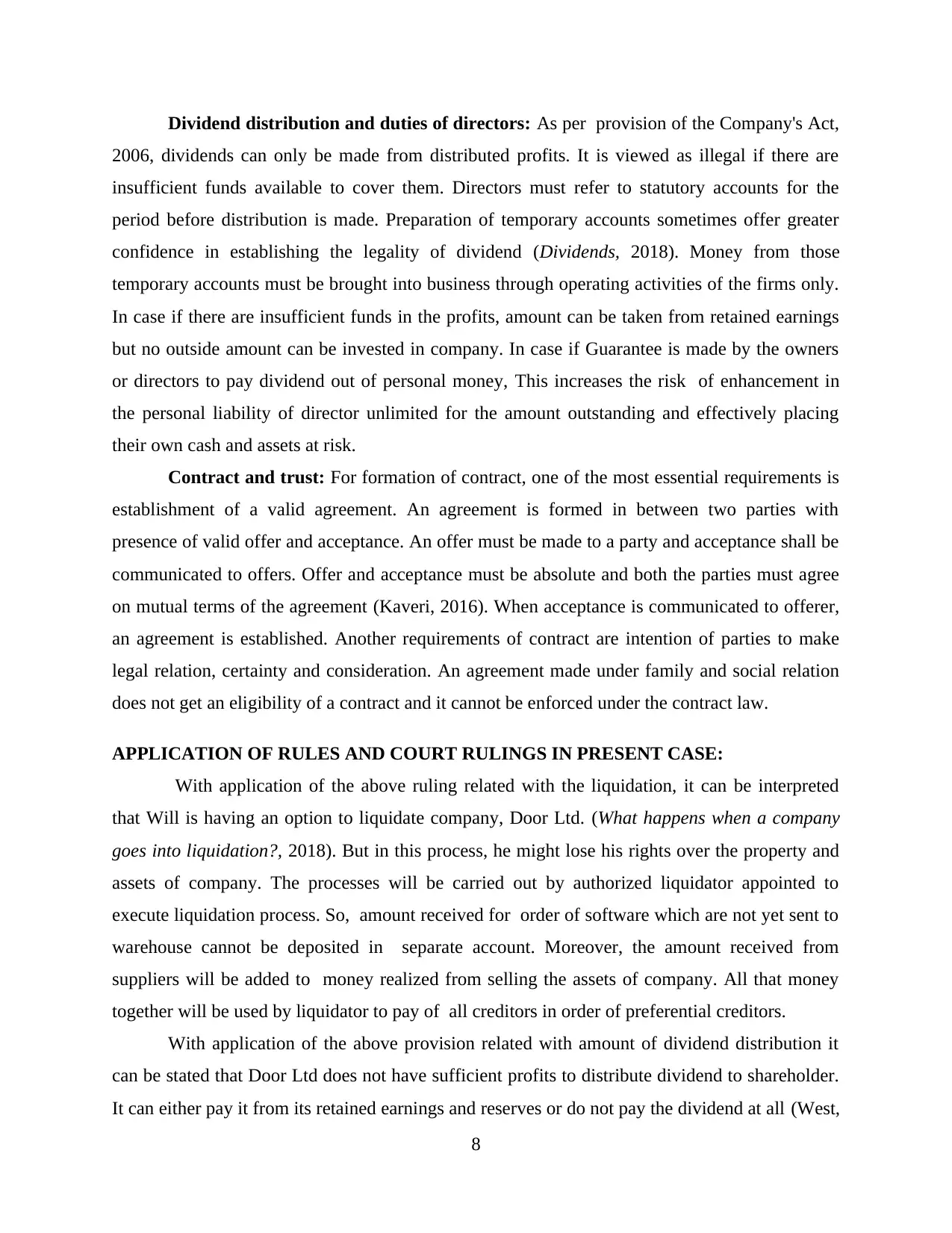
Dividend distribution and duties of directors: As per provision of the Company's Act,
2006, dividends can only be made from distributed profits. It is viewed as illegal if there are
insufficient funds available to cover them. Directors must refer to statutory accounts for the
period before distribution is made. Preparation of temporary accounts sometimes offer greater
confidence in establishing the legality of dividend (Dividends, 2018). Money from those
temporary accounts must be brought into business through operating activities of the firms only.
In case if there are insufficient funds in the profits, amount can be taken from retained earnings
but no outside amount can be invested in company. In case if Guarantee is made by the owners
or directors to pay dividend out of personal money, This increases the risk of enhancement in
the personal liability of director unlimited for the amount outstanding and effectively placing
their own cash and assets at risk.
Contract and trust: For formation of contract, one of the most essential requirements is
establishment of a valid agreement. An agreement is formed in between two parties with
presence of valid offer and acceptance. An offer must be made to a party and acceptance shall be
communicated to offers. Offer and acceptance must be absolute and both the parties must agree
on mutual terms of the agreement (Kaveri, 2016). When acceptance is communicated to offerer,
an agreement is established. Another requirements of contract are intention of parties to make
legal relation, certainty and consideration. An agreement made under family and social relation
does not get an eligibility of a contract and it cannot be enforced under the contract law.
APPLICATION OF RULES AND COURT RULINGS IN PRESENT CASE:
With application of the above ruling related with the liquidation, it can be interpreted
that Will is having an option to liquidate company, Door Ltd. (What happens when a company
goes into liquidation?, 2018). But in this process, he might lose his rights over the property and
assets of company. The processes will be carried out by authorized liquidator appointed to
execute liquidation process. So, amount received for order of software which are not yet sent to
warehouse cannot be deposited in separate account. Moreover, the amount received from
suppliers will be added to money realized from selling the assets of company. All that money
together will be used by liquidator to pay of all creditors in order of preferential creditors.
With application of the above provision related with amount of dividend distribution it
can be stated that Door Ltd does not have sufficient profits to distribute dividend to shareholder.
It can either pay it from its retained earnings and reserves or do not pay the dividend at all (West,
8
2006, dividends can only be made from distributed profits. It is viewed as illegal if there are
insufficient funds available to cover them. Directors must refer to statutory accounts for the
period before distribution is made. Preparation of temporary accounts sometimes offer greater
confidence in establishing the legality of dividend (Dividends, 2018). Money from those
temporary accounts must be brought into business through operating activities of the firms only.
In case if there are insufficient funds in the profits, amount can be taken from retained earnings
but no outside amount can be invested in company. In case if Guarantee is made by the owners
or directors to pay dividend out of personal money, This increases the risk of enhancement in
the personal liability of director unlimited for the amount outstanding and effectively placing
their own cash and assets at risk.
Contract and trust: For formation of contract, one of the most essential requirements is
establishment of a valid agreement. An agreement is formed in between two parties with
presence of valid offer and acceptance. An offer must be made to a party and acceptance shall be
communicated to offers. Offer and acceptance must be absolute and both the parties must agree
on mutual terms of the agreement (Kaveri, 2016). When acceptance is communicated to offerer,
an agreement is established. Another requirements of contract are intention of parties to make
legal relation, certainty and consideration. An agreement made under family and social relation
does not get an eligibility of a contract and it cannot be enforced under the contract law.
APPLICATION OF RULES AND COURT RULINGS IN PRESENT CASE:
With application of the above ruling related with the liquidation, it can be interpreted
that Will is having an option to liquidate company, Door Ltd. (What happens when a company
goes into liquidation?, 2018). But in this process, he might lose his rights over the property and
assets of company. The processes will be carried out by authorized liquidator appointed to
execute liquidation process. So, amount received for order of software which are not yet sent to
warehouse cannot be deposited in separate account. Moreover, the amount received from
suppliers will be added to money realized from selling the assets of company. All that money
together will be used by liquidator to pay of all creditors in order of preferential creditors.
With application of the above provision related with amount of dividend distribution it
can be stated that Door Ltd does not have sufficient profits to distribute dividend to shareholder.
It can either pay it from its retained earnings and reserves or do not pay the dividend at all (West,
8
Paraphrase This Document
Need a fresh take? Get an instant paraphrase of this document with our AI Paraphraser
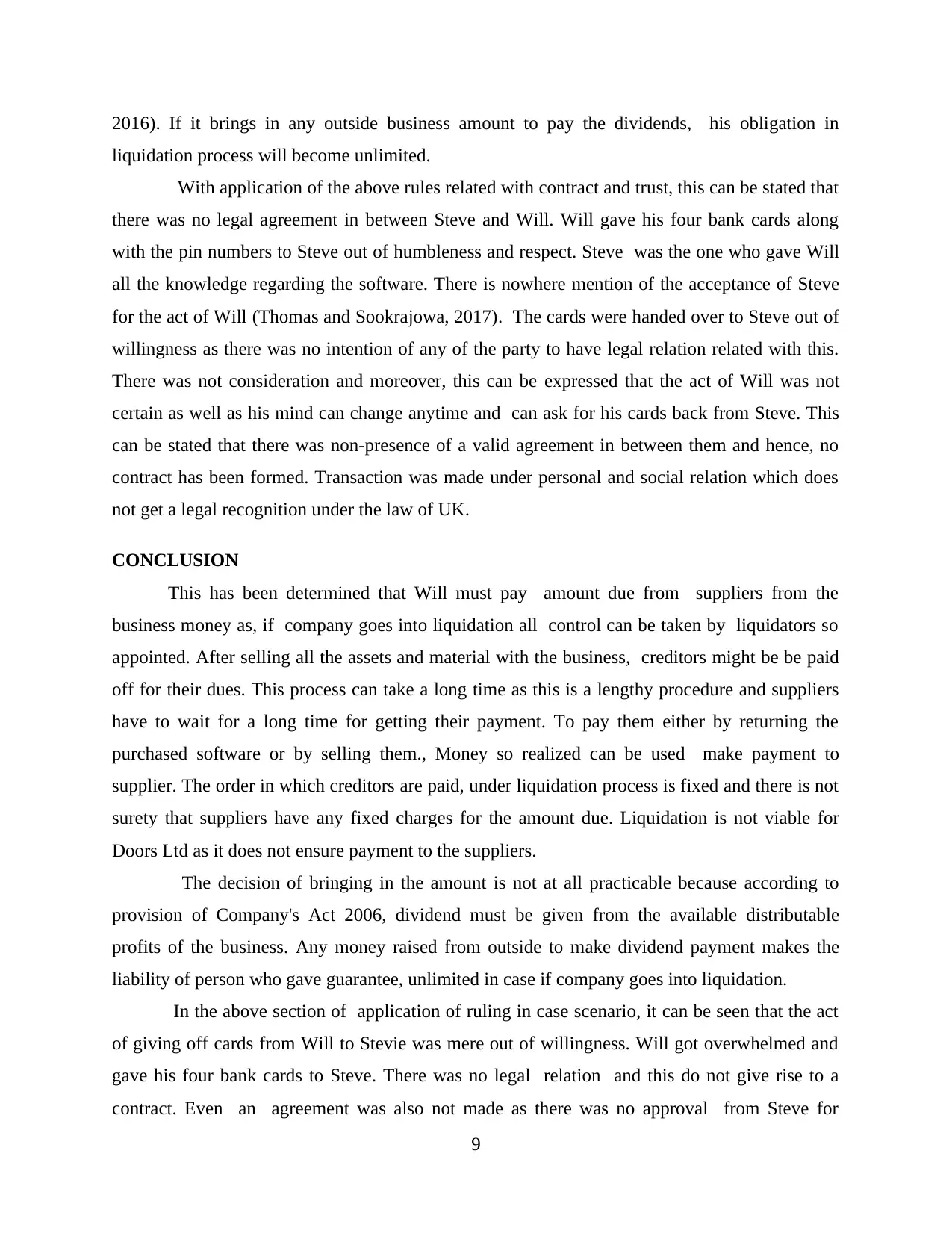
2016). If it brings in any outside business amount to pay the dividends, his obligation in
liquidation process will become unlimited.
With application of the above rules related with contract and trust, this can be stated that
there was no legal agreement in between Steve and Will. Will gave his four bank cards along
with the pin numbers to Steve out of humbleness and respect. Steve was the one who gave Will
all the knowledge regarding the software. There is nowhere mention of the acceptance of Steve
for the act of Will (Thomas and Sookrajowa, 2017). The cards were handed over to Steve out of
willingness as there was no intention of any of the party to have legal relation related with this.
There was not consideration and moreover, this can be expressed that the act of Will was not
certain as well as his mind can change anytime and can ask for his cards back from Steve. This
can be stated that there was non-presence of a valid agreement in between them and hence, no
contract has been formed. Transaction was made under personal and social relation which does
not get a legal recognition under the law of UK.
CONCLUSION
This has been determined that Will must pay amount due from suppliers from the
business money as, if company goes into liquidation all control can be taken by liquidators so
appointed. After selling all the assets and material with the business, creditors might be be paid
off for their dues. This process can take a long time as this is a lengthy procedure and suppliers
have to wait for a long time for getting their payment. To pay them either by returning the
purchased software or by selling them., Money so realized can be used make payment to
supplier. The order in which creditors are paid, under liquidation process is fixed and there is not
surety that suppliers have any fixed charges for the amount due. Liquidation is not viable for
Doors Ltd as it does not ensure payment to the suppliers.
The decision of bringing in the amount is not at all practicable because according to
provision of Company's Act 2006, dividend must be given from the available distributable
profits of the business. Any money raised from outside to make dividend payment makes the
liability of person who gave guarantee, unlimited in case if company goes into liquidation.
In the above section of application of ruling in case scenario, it can be seen that the act
of giving off cards from Will to Stevie was mere out of willingness. Will got overwhelmed and
gave his four bank cards to Steve. There was no legal relation and this do not give rise to a
contract. Even an agreement was also not made as there was no approval from Steve for
9
liquidation process will become unlimited.
With application of the above rules related with contract and trust, this can be stated that
there was no legal agreement in between Steve and Will. Will gave his four bank cards along
with the pin numbers to Steve out of humbleness and respect. Steve was the one who gave Will
all the knowledge regarding the software. There is nowhere mention of the acceptance of Steve
for the act of Will (Thomas and Sookrajowa, 2017). The cards were handed over to Steve out of
willingness as there was no intention of any of the party to have legal relation related with this.
There was not consideration and moreover, this can be expressed that the act of Will was not
certain as well as his mind can change anytime and can ask for his cards back from Steve. This
can be stated that there was non-presence of a valid agreement in between them and hence, no
contract has been formed. Transaction was made under personal and social relation which does
not get a legal recognition under the law of UK.
CONCLUSION
This has been determined that Will must pay amount due from suppliers from the
business money as, if company goes into liquidation all control can be taken by liquidators so
appointed. After selling all the assets and material with the business, creditors might be be paid
off for their dues. This process can take a long time as this is a lengthy procedure and suppliers
have to wait for a long time for getting their payment. To pay them either by returning the
purchased software or by selling them., Money so realized can be used make payment to
supplier. The order in which creditors are paid, under liquidation process is fixed and there is not
surety that suppliers have any fixed charges for the amount due. Liquidation is not viable for
Doors Ltd as it does not ensure payment to the suppliers.
The decision of bringing in the amount is not at all practicable because according to
provision of Company's Act 2006, dividend must be given from the available distributable
profits of the business. Any money raised from outside to make dividend payment makes the
liability of person who gave guarantee, unlimited in case if company goes into liquidation.
In the above section of application of ruling in case scenario, it can be seen that the act
of giving off cards from Will to Stevie was mere out of willingness. Will got overwhelmed and
gave his four bank cards to Steve. There was no legal relation and this do not give rise to a
contract. Even an agreement was also not made as there was no approval from Steve for
9
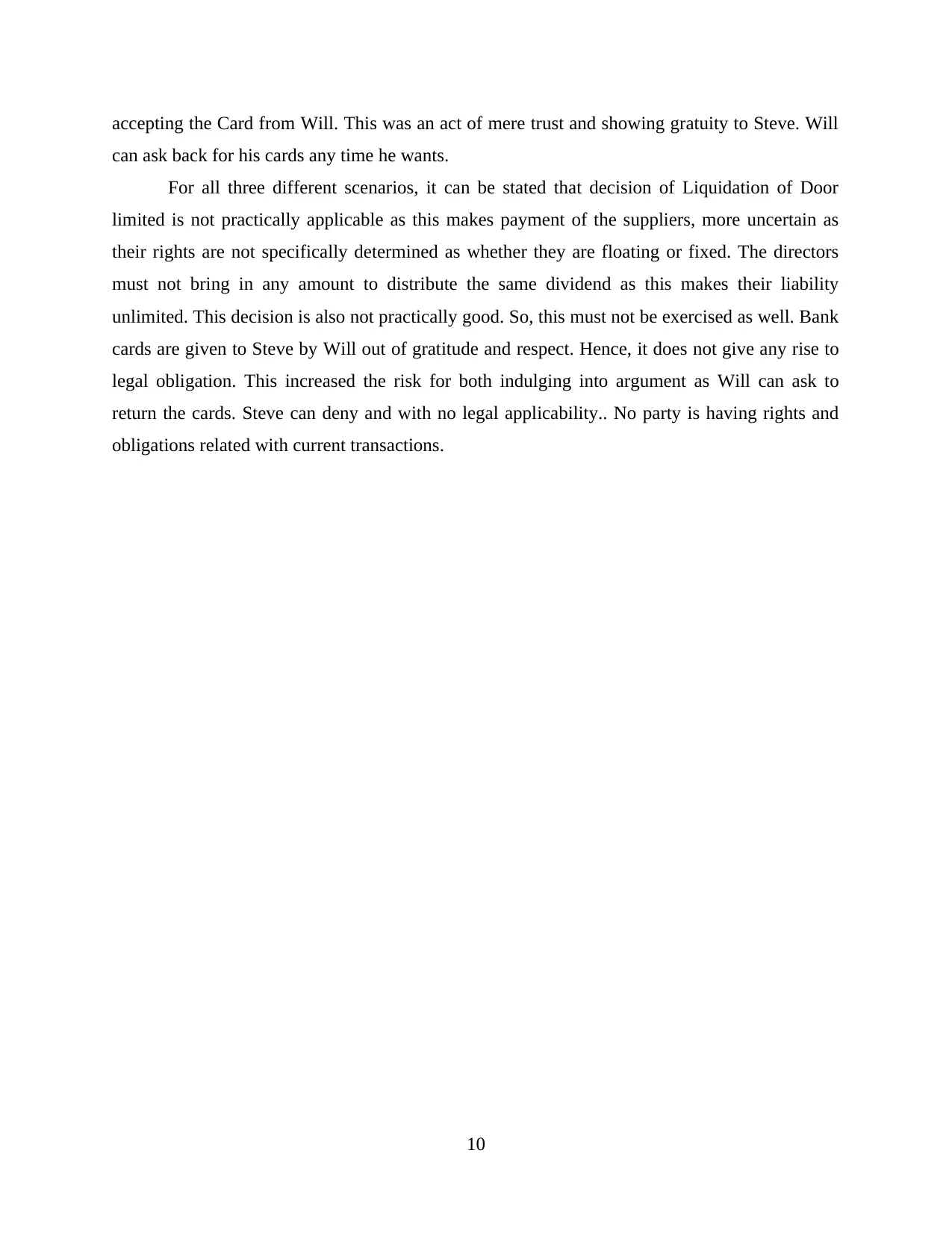
accepting the Card from Will. This was an act of mere trust and showing gratuity to Steve. Will
can ask back for his cards any time he wants.
For all three different scenarios, it can be stated that decision of Liquidation of Door
limited is not practically applicable as this makes payment of the suppliers, more uncertain as
their rights are not specifically determined as whether they are floating or fixed. The directors
must not bring in any amount to distribute the same dividend as this makes their liability
unlimited. This decision is also not practically good. So, this must not be exercised as well. Bank
cards are given to Steve by Will out of gratitude and respect. Hence, it does not give any rise to
legal obligation. This increased the risk for both indulging into argument as Will can ask to
return the cards. Steve can deny and with no legal applicability.. No party is having rights and
obligations related with current transactions.
10
can ask back for his cards any time he wants.
For all three different scenarios, it can be stated that decision of Liquidation of Door
limited is not practically applicable as this makes payment of the suppliers, more uncertain as
their rights are not specifically determined as whether they are floating or fixed. The directors
must not bring in any amount to distribute the same dividend as this makes their liability
unlimited. This decision is also not practically good. So, this must not be exercised as well. Bank
cards are given to Steve by Will out of gratitude and respect. Hence, it does not give any rise to
legal obligation. This increased the risk for both indulging into argument as Will can ask to
return the cards. Steve can deny and with no legal applicability.. No party is having rights and
obligations related with current transactions.
10
⊘ This is a preview!⊘
Do you want full access?
Subscribe today to unlock all pages.

Trusted by 1+ million students worldwide
1 out of 13
Your All-in-One AI-Powered Toolkit for Academic Success.
+13062052269
info@desklib.com
Available 24*7 on WhatsApp / Email
![[object Object]](/_next/static/media/star-bottom.7253800d.svg)
Unlock your academic potential
Copyright © 2020–2026 A2Z Services. All Rights Reserved. Developed and managed by ZUCOL.

